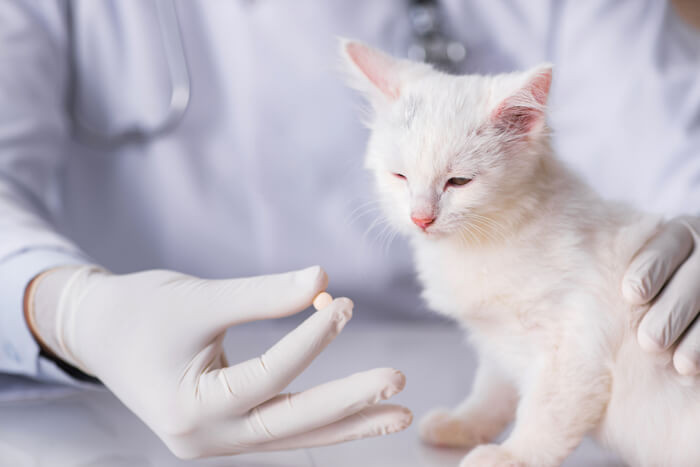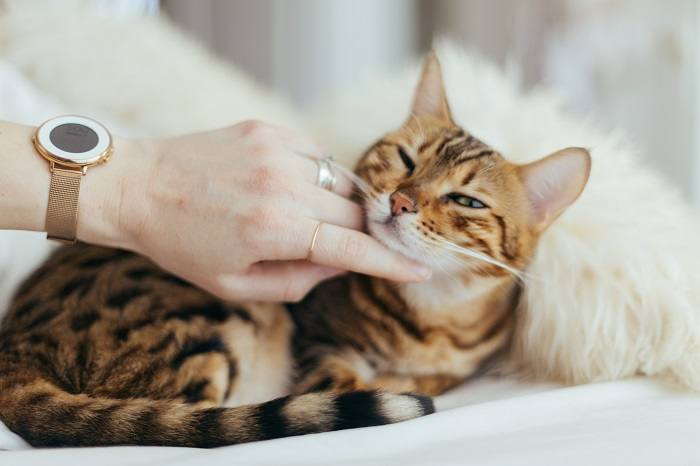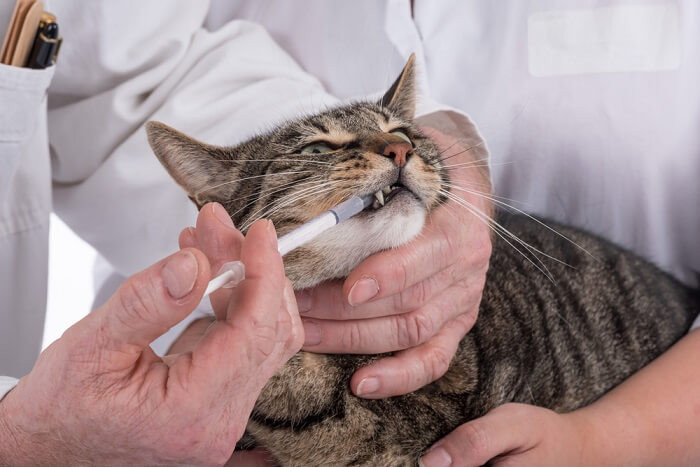 Veterinarian carefully administers Albon pill to a cat for coccidiosis treatment
Veterinarian carefully administers Albon pill to a cat for coccidiosis treatment
Albon, the brand name for the generic drug sulfadimethoxine, is a common medication prescribed by veterinarians to treat coccidiosis in cats. Coccidiosis is an intestinal parasitic infection caused by coccidia protozoa. If your cat has been diagnosed with this condition, understanding Albon can help you navigate their treatment effectively. This article provides a detailed overview of Albon For Cats, covering its mechanism of action, uses, dosage guidelines, potential side effects, and answers to frequently asked questions.
What is Albon (Sulfadimethoxine) for Cats?
Albon is the trade name for sulfadimethoxine, classified as a sulfonamide antimicrobial. While sometimes referred to as a sulfa antibiotic, it’s important to note that sulfadimethoxine primarily targets protozoa, not bacteria in the typical sense of antibiotics. Its main use in feline medicine is to combat infections caused by Isospora, a specific group of coccidia parasites.
Isospora parasites are single-celled organisms, not worms or bacteria. They reside in the intestines and are a frequent cause of gastrointestinal issues in cats, particularly kittens. Sulfadimethoxine works by disrupting the parasite’s ability to produce folic acid, or vitamin B9, which is essential for their survival and reproduction. Mammalian cells, including cats, obtain folic acid from their diet and are therefore unaffected by this mechanism, making Albon selectively toxic to the parasite.
Why is Albon Prescribed for Cats? Treating Coccidiosis
The primary reason veterinarians prescribe Albon for cats is to treat coccidiosis, an infection caused by Isospora coccidia parasites. These parasites are a common culprit behind intestinal distress in cats, especially in younger felines. Kittens are particularly vulnerable because their immune systems are still developing, and they are often housed in environments where coccidia can easily spread, such as shelters or breeding facilities.
Coccidiosis can lead to a range of unpleasant symptoms in cats, including:
- Watery diarrhea, sometimes severe
- Vomiting
- Abdominal pain
- Dehydration
- Loss of appetite
- Weight loss
Cats can contract Isospora through various routes. Kittens often acquire it from their mothers, especially if the mother is a carrier. Exposure to infected feces in the environment is another common transmission method. Even adult cats, while possibly asymptomatic carriers, can shed oocysts (the egg-like stage of coccidia) and pose a risk to more susceptible cats, especially kittens and immunocompromised individuals.
Veterinarians often recommend treating cats that test positive for Isospora oocysts in their fecal samples, even if the cat isn’t currently showing symptoms. This proactive approach helps prevent the development of clinical disease and reduces the risk of transmission to other animals. It’s crucial to remember that Isospora is species-specific and does not infect humans.
Albon is frequently the first-line treatment for Isospora infections in cats due to its effectiveness and relatively low cost. While resistance to Albon is not common, it can occur. In such cases, alternative medications are available, though they might be more expensive or present challenges in terms of administration.
Albon Dosage and Administration for Cats
The standard FDA-approved dosage of Albon for cats is an initial dose of 55 mg/kg of body weight on the first day of treatment. This is followed by a reduced daily dose of 27.5 mg/kg for the subsequent days. It’s crucial to adhere to your veterinarian’s specific instructions regarding the duration of treatment, as it can vary based on the severity of the infection and the cat’s response to the medication. Treatment typically lasts from 5 to 10 days, but longer courses are sometimes necessary in persistent cases.
Albon is available in two common oral forms:
- Oral Suspension (50 mg/ml): This liquid form is often preferred for kittens and cats who have difficulty swallowing pills, ensuring accurate dosing and easier administration.
- Tablets (125mg, 250mg, 500mg): Tablets are suitable for older kittens and adult cats. However, administering pills to cats can sometimes be challenging.
Regardless of the form, always follow your vet’s dosage instructions precisely. If you are giving Albon in liquid form, use a calibrated syringe to measure the dose accurately. For tablets, ensure your cat swallows the entire pill. Pill pockets or wrapping the tablet in a small amount of palatable food can sometimes ease administration.
If Albon is prescribed based on a fecal test finding Isospora oocysts, your veterinarian will likely request a follow-up fecal examination a couple of weeks after treatment completion to confirm the infection has been successfully cleared.
Potential Side Effects of Albon in Cats and Safety Considerations
 Concerned cat owner checks on their sick cat, highlighting the need for attention and care during coccidiosis treatment with Albon
Concerned cat owner checks on their sick cat, highlighting the need for attention and care during coccidiosis treatment with Albon
Albon is generally considered safe and well-tolerated by cats. Side effects are not common when used at recommended dosages and for the typical duration of treatment. However, as with any medication, potential side effects can occur.
The most common side effect associated with Albon and sulfonamides in general is mild gastrointestinal upset. This can manifest as:
- Loss of appetite
- Vomiting
- Diarrhea
It’s important to note that while Albon can cause diarrhea in some cats due to its effect on gut flora, it is usually prescribed to treat diarrhea caused by coccidia. In most cases, cats with coccidiosis-related diarrhea will experience improvement in their stools during Albon treatment.
Hypersensitivity reactions to Albon are rare in cats but can occur. Signs of an allergic reaction may include:
- Skin rash
- Fever
- Facial swelling
- Difficulty breathing
If you observe any signs of an allergic reaction, discontinue Albon and contact your veterinarian immediately.
Side effects are more frequently reported in dogs and at higher doses or with prolonged use of sulfonamides. However, in cats treated for coccidiosis, high doses and extended treatment periods are uncommon.
When to Contact Your Veterinarian:
- If you observe any concerning side effects after administering Albon.
- If your cat’s diarrhea or other symptoms worsen during treatment.
- If you miss a dose of Albon and are unsure of what to do.
- If your cat’s symptoms do not improve after a few days of treatment.
Albon for Cats: Addressing Common Concerns
Does Albon Effectively Treat Diarrhea in Cats?
Albon is effective against diarrhea only when the underlying cause is a susceptible organism, primarily Isospora coccidia in cats. If your cat’s diarrhea is due to a different reason, such as a bacterial infection, viral infection, dietary indiscretion, or other parasites, Albon will not be effective and may even be inappropriate. It’s crucial to have your veterinarian diagnose the cause of your cat’s diarrhea to determine the most appropriate treatment.
Is Albon Safe for Cats, Including Kittens?
Albon is FDA-approved for use in cats and is generally considered safe when used as directed by a veterinarian. Side effects are uncommon, especially when administered at the correct dosage and for the recommended duration. While some side effects seen in dogs with sulfonamides, like dry eye, have not been reported in cats, it’s still important to monitor your cat for any adverse reactions. Albon can be safely used in kittens, with dosage adjustments based on their weight.
How Much Albon Should I Give My Kitten?
The correct dosage of Albon for kittens, as for adult cats, is based on their body weight. The standard starting dose is 55 mg per kilogram of body weight on the first day, followed by 27.5 mg/kg daily for the remainder of the treatment course, typically 5-10 days. Never guess or estimate the dosage. Always consult your veterinarian for the precise dosage instructions for your kitten, as accurate dosing is crucial for both safety and effectiveness. It’s also important to remember that while proactive coccidia treatment is sometimes practiced in shelters, it’s essential to have a proper diagnosis before administering any medication to your kitten. Diarrhea in kittens can have various causes, and Albon is only effective against coccidiosis caused by Isospora.
Conclusion: Partnering with Your Veterinarian for Your Cat’s Health
 Tabby cat calmly receives liquid Albon medication, emphasizing the ease of administration for effective coccidiosis treatment
Tabby cat calmly receives liquid Albon medication, emphasizing the ease of administration for effective coccidiosis treatment
Albon (sulfadimethoxine) is a valuable medication for treating Isospora-induced coccidiosis, a common intestinal parasitic infection in cats. Its effectiveness, affordability, and generally good safety profile make it a favored first-line treatment option for this condition. However, it’s crucial to remember that Albon is not a broad-spectrum antibiotic and is specifically targeted for coccidia parasites.
Always consult with your veterinarian for a proper diagnosis and treatment plan for your cat. They will determine if Albon is the right medication for your cat’s specific condition, calculate the correct dosage, and guide you on the duration of treatment and necessary follow-up care. Never administer any medication to your cat without veterinary guidance. Working closely with your vet ensures your feline companion receives the best possible care and a swift return to health.
Disclaimer: This article provides general information about Albon for cats and should not be considered a substitute for professional veterinary advice. Always consult with your veterinarian for diagnosis and treatment of your cat’s medical conditions. Dosage information provided is based on FDA label guidelines and may vary based on your veterinarian’s professional judgment.


